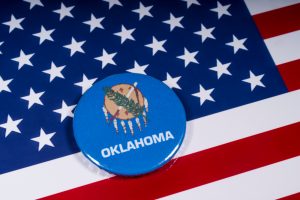
Republican legislation sponsored by U.S. Rep. Tom Cole (R-OK) to change a federal law that has restricted how Native Americans in Oklahoma bequeath land to their heirs recently received final approval in Congress.
The bill was signed into law by President Trump on Dec. 31, 2018.
The U.S. House of Representatives on Dec. 20 voted 399-0 to accept U.S. Senate changes to the Stigler Act Amendments of 2018, H.R. 2606, which Rep. Cole introduced in May 2017 with U.S. Reps. Markwayne Mullin (R-OK), Frank Lucas (R-OK), and Steve Russell (R-OK).
“I am pleased that both chambers of Congress approved changes to the misguided Stigler Act of 1947, which clearly discriminates against citizens of Oklahoma’s five tribes,” said Rep. Cole, a citizen of the Chickasaw Nation and co-chairman of the Native American Caucus.
H.R. 2606 would amend the Stigler Act of 1947, a law that restricts Native American-allotted land to only those persons with one-half degree or more of Native American blood. The legislation specifically impacts citizens of Oklahoma’s five tribes: the Chickasaw, Cherokee, Choctaw, Muscogee (Creek) and Seminole nations.
“Land ownership is part of that unique inheritance for many tribal citizens and their descendants, and over the years, the Stigler Act has unfortunately diminished that rightful inheritance due to an unfair blood quantum requirement,” the congressman added. “By amending the Stigler Act, I am proud that the rights and privileges promised to all Native Americans will also be extended to Oklahoma’s five tribes.”
According to background information provided by Rep. Cole’s office, the federal government was authorized by the Dawes Act of 1887 to survey tribal lands and divide them into allotments for individual tribal citizens of Oklahoma’s five tribes. The Stigler Act of 1947 then required that for heirs and devisees to hold a title, they must have at least one-half degree Native American blood to retain “restricted fee” status of allotted land, which isn’t subject to state taxation.
Federal law doesn’t set a minimum Native American blood quantum requirement for any other tribe in such instances, according to the congressman’s office, which added that removing this requirement via H.R. 2606 would establish parity in how federal law treats all Native Americans.
Rep. Mullin, a citizen of the Cherokee Nation and vice-chairman of the Native American Caucus, said that land handed down from generation to generation in Native American families is a part of the culture.
“It is what allows families like mine to continually pass their family’s history on to the next generation,” he said, adding that members of his state’s five tribes “deserve the right to hand down their history without blood quantum requirements — just like members of every other tribe can.”



